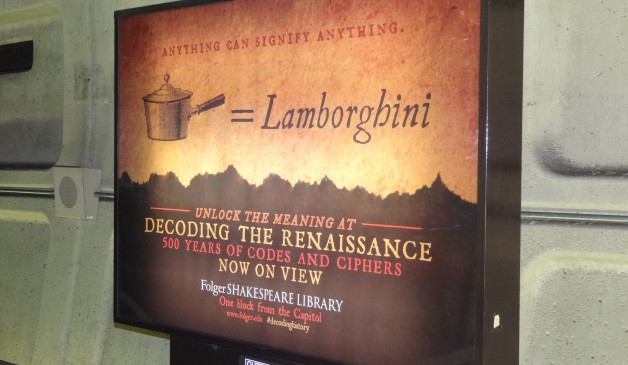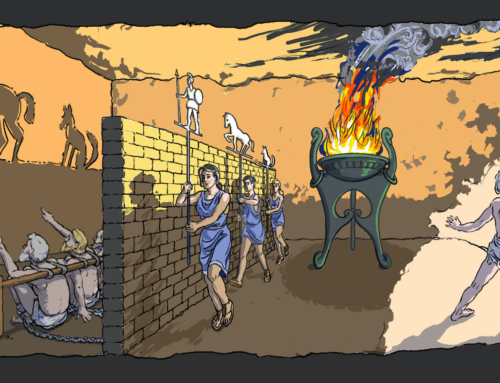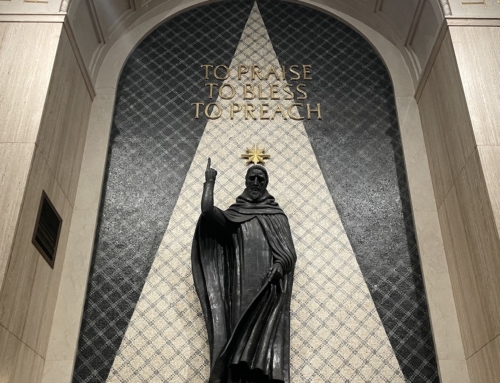In fairness, the ad really should have been quite appealing to me. My nerdy streak gives me a soft spot for anything to do with codes and ciphers and, since entering the Order, I have a growing affinity for the history of science and especially the primary sources involved. An exhibit on cryptography in Renaissance manuscripts actually sounds fascinating. Nevertheless, my initial reaction to the ad in the Metro station wasn’t intrigue at the juxtaposition of a pot and the word “Lamborghini.” I’d place it somewhere between Indiana Jones bumping into the Nazis and Captain Kirk screaming at Khan. Upon seeing the tagline “anything can signify anything,” the only thing that came to mind was a frustrated refrain of “Nominalism.”
Dominicans have a history with Nominalism, and not simply because it became one of the prominent competitors to Thomism from the fourteenth century on. Even if we never hear anyone explicitly rallying to its flag these days, many Thomists see Nominalism as the original source of a startling percentage of today’s troubling and pervasive ideas.
At heart, Nominalism is an attempt to explain why we call a cat a cat. It’s not concerned with the etymology of the word “cat” but with why it is even possible to give a single name to all of these animals. The central claim of Nominalism is that only individual realities exist; there is only Fluffy and Garfield and Mittens, and each is completely singular and unique in its existence. Universals, like the word “cat,” are simply useful labels that we humans can apply to things that we perceive as being similar, but do not correspond to anything in reality. There is no such thing as cat nature that is really shared by each cat and gives a real basis for grouping them as a species. There is simply a name. Of course, this goes beyond felinology to all universals. Most troubling is that Nominalism claims there is no such thing as human nature, simply individual, unrelated human beings.
When considered from a theological perspective, Nominalism has a drastic effect on our relationship to God. Whatever order and structure we may observe in the world cannot be rooted in the real relationship between different types of things, because there are no types of things to relate. Whatever order we find can only be rooted in God’s free choice. Thomists absolutely agree that God created and continues to maintain creation with absolute freedom, but they see the result of that freedom as an expression of God’s providential wisdom. For the Nominalist, the majesty of the created order is not really a glimpse at God’s wisdom but simply of the way he wants things to be for the moment. In the moral order, if there is no such thing as human nature, there is no such thing as natural inclination towards happiness or natural law. There is no rational reason behind what makes a particular action good or bad; there is only God’s free choice. William of Ockham, the founder of scholastic Nominalism, took this extreme Voluntarism, this overemphasis on God’s free will, so far as to claim, “God can command the created will to hate him,” and by that command, the hatred of God would be good. He saw this as possible not simply in this world. Rather, “just as hatred of God can be a good act in this world, so can it be in the next.” Ockham never claimed that God had ever commanded this, and Ockham recognized a customary order in things. But he held on to the idea that there was no guarantee that this order would not completely change tomorrow.
As influential as Nominalism was in the 14th century and continues to be in various guises today, the phrase “anything can signify anything” isn’t really expressing medieval Nominalism. It is expressing a sort of New Nominalism* that we see in today’s culture, a sort of modern amalgamation of Nominalism and Voluntarism, but without even God as the ultimate arbiter. There seems to be a growing trend that assumes not only that universals are merely names with no real significance, but even that the meaning of these names is entirely up to the free will of each individual. What it means to be a man or a woman is becoming something subjective and self-defined. Whether a slur is really a slur or a sign of affection is simply up to the one who uses it or who hears it. Further, this personal Voluntarism ensures that no one need be bound by their past opinions on a word from one moment to the next. What was once, in the moment, a life-long vow “for better or for worse” might eventually become simply a nice turn of phrase, said on a day long ago but that never really meant anything.
That ad in the Metro station really was simply that, an intriguing ad for an interesting looking exhibit on the history of cryptography. Nevertheless it caught my eye as expressing, unintentionally, one of the more pernicious trends in contemporary discourse. While Nominalism tended to cut us off from God’s wisdom and the well-ordered plan of salvation, the New Nominalism introduces a sort of man-made Babel, cutting us off from one another and even from our very selves. When words, including universals, lose their connection to an objective reality, we lose the ability to speak honestly about truth and goodness. While it may be true on some abstract level that “anything can signify anything,” only certain things actually signify the truth, only certain statements actually correspond to the reality they are conveying. Without trust in the reality underlying our words, the truth about ourselves and about God will always escape us, no matter how hard we will otherwise.
____________________
* Credit for the name “New Nominalism” has to be given to Fr. Dominic Langevin, O.P., Instructor in Systematic Theology at the Pontifical Faculty of the Immaculate Conception.
✠
Image: Metro Advertisement







